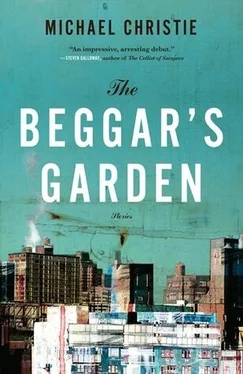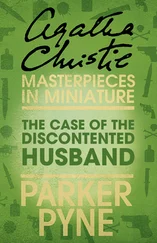Best of all, their partnership proved to be a merciful distraction. The few times Sam had managed to speak to Cricket she’d been monosyllabic, and he detected in her tone the same limpness she’d shown on her eighth birthday when a girl gave her a pop-up book that she’d had memorized since she was three. His conversations with Anna were curt and perfunctory. A terrible mutual unfathomability had befallen them. Greetings and passing comments whipped up connotations in the other’s mind that were far removed from their intended meaning. Now, when looking back at those months before Anna’s departure, Sam couldn’t say they had lacked signs of what was to come. Anna had commenced a campaign to rid them of clutter, donating furniture and clothes — theirs, Cricket’s, anything that hadn’t been worn in a year was her rule — to a church thrift store a few blocks over. This appeared now to Sam akin to the mute crew of a bombarded ship throwing their cargo overboard to buy a few minutes more before submergence.
When a few weeks had passed with no measurable increases in Isaac’s profit, Sam considered more drastic adjustments. Isaac had sat on the same spot for twenty-five years, thus violating the begging must be only temporary rule that Sam had established early on. After hours of searching, Sam found the perfect new place: “historic” Gastown, where hundreds of stunned cruise-ship passengers, mostly sturdy, khakied Scandinavian couples or wary American families all in the same leather-strapped baseball hat, washed ashore to lumber and gawk on the bricked sidewalks and hold aloft tiny cameras clasped between forefinger and thumb, aiming at landmarks such as the famous steam-driven clock. There’d be plenty of change in their pockets, left over from purchases of smoked salmon in mailable cedar boxes, authentic Coast Salish carvings, Cowichan sweaters, and four-litre canisters of maple syrup. The tourists were ideal — an ever-rotating and disposably incomed clientele who barely understood the Canadian system of currency — for Isaac to intercept and ply his trade.
The area already supported many beggars, who mostly encircled the bustling currency exchange kiosk. But this area was dark and crowded. Sam took two days off work to comb Gastown for a south-facing spot, as favourable lighting went a long way toward positive judgment of character. He found the perfect nook near a chain coffee shop, with a nice overhang to shelter Isaac from the rain.
“People been coming to me for twenty-some odd years,” Isaac said wistfully when Sam informed him of the relocation. “I got a whole bunch of interest in this place, the sights’re familiar to me, I could tell you who’s gonna walk past just by looking at how the sun comes off that parking sign.”
“I can understand that,” Sam said, “but this is going to double our profits — that’s a conservative estimate.”
“I suppose it will,” said Isaac.
And it did. The tourists were helpless against Isaac’s dirty feet and murmurs of humble appreciation. To celebrate, Sam offered to take him on a road trip. It had been eight years since Isaac had left the neighbourhood, so Sam scheduled the next Monday off to drive him to a rainy beach where Isaac ate two ice cream cones and stuffed his pockets with the unremarkable grey shells that were scattered in the dark sand like bad coins.
“Looks like I gotta find a new patch to rest my head,” Isaac said on the ride home. “The cops been coming round the train bridge and kicking over shelters.”
“Why don’t you rent a room?” said Sam. “You could afford it, we could do up a budget.”
“Nope. That ain’t me,” Isaac said, doing his best to contain an indignance. “I’d rather sleep out in the air than shack up with the crackheads and rip-offs in one of those roached-up, firetrap hotels.” To this Sam agreed and Isaac’s anger waned. Isaac spent a quiet moment investigating the mechanism of his power window, stuttering it in place like a broken robot.
“I’ll find something,” Isaac said as they sailed over the Granville Bridge, high above the pleasure boats that bumped together in the False Creek marina. “I been very lucky in my life, for the most part, and I got a few good years left.” Though Sam could not apply the same outlook to his own situation, the old beggar’s almost pathological optimism, as misguided as it may have been, warmed his heart, like the astronaut dreams of children.
That evening, when he returned home, he discovered a text message from Anna requesting he fly out to Calgary for Cricket’s birthday. The message was worded with her usual legal precision melded with a kind of forced casualness, though underneath it Sam perceived a tingle of warmth, so he agreed and booked a ticket. The thought of his shed standing empty while Isaac wandered the city in search of a new cranny to crawl into did not sit right with him. He asked Isaac if he wanted to housesit while he was gone.
“They’re really fixing this old neighbourhood up nice, aren’t they?” Isaac said, as they approached Sam’s house the following evening. “I used to live in a rooming house a few blocks over. This was years ago. Don’t remember much of that, to tell the truth,” he said. “Rice wine.” These last words he uttered with a distal stare as if invoking the name of a demon.
Walking up to the house, Isaac emitted a long descending whistle that sounded like a bomb. Sam clicked opened the side gate and led him around back.
“This is most definitely kind of you to have me stay back here. No worry, I won’t bug you or come by the house or nothing, because I respect a man’s private moments and whatnot,” Isaac said, setting his suitcase down on the cot beside the window.
“Actually, that’s my bed,” Sam said. “You sleep over there.” He pointed to the bedroll set against the opposing wall.
Isaac’s eyes darted to the square broken-out window that faced the rear of Sam’s towering home. He displayed a puzzlement that arrived and dispersed almost immediately. “You’re the adviser,” he said, and rearranged his things.
For dinner, Isaac cut some stumps of wiener into a pot of baked beans that he warmed on the camp stove. It would be a long painful walk for the old guy to his usual begging position in Gastown, so Sam suggested he take a few days off, which he would reimburse of course. “I’m not sure I’m in need of too much free time to chew on,” Isaac said. “It’s always done me no good in the past. But maybe I’ll go collecting some bottles.”
While they ate, Isaac sucked brown sauce from the grey mottle of his beard, and it occurred to Sam that he hadn’t touched his own shaver in weeks. He wasn’t sure of the bank’s dress code but could think of several bearded co-workers as proof he wasn’t endangering himself. Granted, they were contained, manicured growths, clipped and neatly edged, not like the unruly mass of spindly blond that now abounded on his chin. The point was moot anyway, because Sam hadn’t been at the office as long as he’d had it. There was just so much important work to do with Isaac.
“So it’s your in-laws, then? My condolences,” Isaac said swallowing. “Course I ain’t never been married. But I managed to mix myself up with a few women — some good, some not close to good. But my overall experiences with family ain’t what you’d call positive.”
“You ever get in touch with your parents?”
“Well, my older brother, he’s batshit crazy, locked up since he was just a young one. Did something terrible to a woman was what people said. After he was gone, my folks weren’t the same. They didn’t take much interest in me no more neither, afraid I’d go the same route. That’s mostly why I went up north to cut trees.”
After he’d packed, Sam did some dishes in a bucket while listening to zephyrs of air whistle through Isaac’s nasal cavity. He’d bedded down, still in his coat, on his back with his head on his pack and his hands deep in his pockets. Sam knocked a tin plate against the galvanized watering can and Isaac’s eyes opened, slick and yellowed in the moonlight.
Читать дальше












